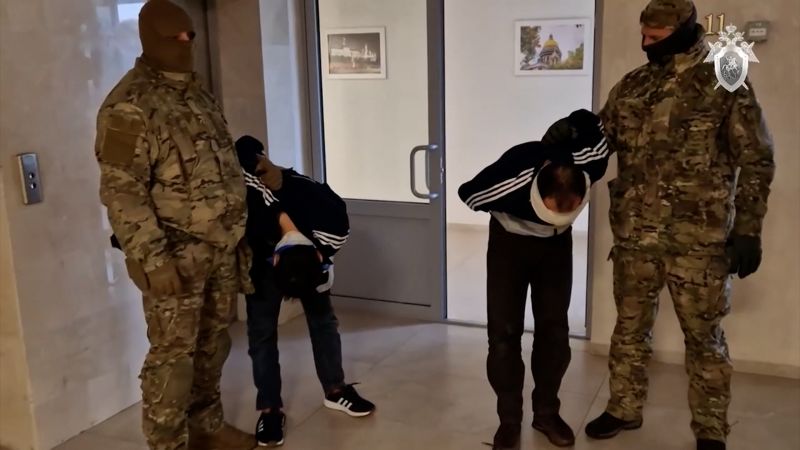
Moscow concert hall attack suspects appear in court as Russia defends security services
The four men suspected of carrying out a brutal attack at a Moscow concert hall that killed at least 139 people have appeared in court on terror charges, as the Kremlin defended its security services criticized for failing to prevent the massacre.
Three of the suspects were bent double as they were marched into the Moscow courtroom late on Sunday night, while the fourth was in a wheelchair and appeared unresponsive.
The suspects, who are from the Central Asian republic of Tajikistan but worked in Russia on temporary or expired visas, were named by Moscow City Court as Dalerdzhon Mirzoyev, Saidakrami Rachabalizoda, Shamsidin Fariduni and Mukhammadsobir Faizov. They face a maximum sentence of life in prison.
They are accused of storming Crocus City Hall in a Moscow suburb on Friday, shooting civilians at point blank before setting the building on fire, causing the roof to collapse while concert-goers were still inside.
ISIS claimed responsibility for the massacre and released graphic footage showing the incident – but Moscow has insinuated, without evidence, that the perpetrators planned to flee to Ukraine. Kyiv has vehemently denied involvement and called the Kremlin’s claims “absurd.”
At a meeting with other government officials on Monday, Russian President Vladimir Putin said the attack had been carried out by “radical Islamists.”
“We know that the crime was committed by radical Islamists, whose ideology the Islamic world itself has been fighting for centuries,” Putin said.
The first suspect charged, Mirzoyev, had a black eye, bruises over his face and a plastic bag wrapped around his neck. Mirzoyev, 32, had a temporary resident permit for three months in the Siberian city of Novosibirsk, but it had expired, Russian state media RIA Novosti reported.
Rachabalizoda, born in 1994, told the court through an interpreter that he has Russian registration documents but could not remember where they are. He appeared in court with a swollen eye and a bandaged ear.
The third defendant, Fariduni, born in 1998, was employed at a factory in the industrial city of Podolsk and registered in Krasnogorsk, both near Moscow.
The three men pleaded guilty to the terrorism charges, Russian media reported. It was unclear what the fourth man, Faizov, born in 2004, pled. He was pictured lying limp in a wheelchair inside a glass cage.
The men looked beaten and injured as they were brought into the courtroom. Videos and still images that appeared to show some of them being violently interrogated, including one apparent use of electrocution, circulated widely on Russian social media.
One video appears to show Rachabalizoda being held on the ground while having part of his ear cut off and stuffed in his mouth by a camouflage-wearing interpreter.
Margarita Simonyan, the editor-in-chief of Russian state propaganda network RT, posted a video of Rachabalizoda appearing in court with a heavily bandaged ear, which she wrote made her “feel nothing but pleasure.”
The four have been remanded into pre-trial detention until May 2022, the court said.
Later Monday, Russia’s Investigative Committee asked the court to detain three other men – two brothers and their father – in connection with the attack, Russian state media TASS reported.
On Monday, three days after the attack, rescuers were still searching among the ruins of the collapsed concert hall and trying to clear rubble. Russia’s Ministry of Emergency Situations said more than 300 “specialists” were working at the site.
The attack, the deadliest on Russian soil in almost two decades, was met with outrage and disbelief in Russia, prompting calls for the harshest of punishments to be meted out.
While the concert hall roof was still burning, ISIS claimed responsibility for the attack and shared a video taken by the men as they stormed the building, where thousands of Russians had arrived to watch the rock group Picnic.
Despite ISIS appearing to provide evidence that its fighters had carried out the attack, Putin and other senior officials have been keen to associate Ukraine with the terror attack.
In a national following the attack – more than 19 hours after it began – Putin on Saturday claimed that a “window” had been prepared for the attackers to escape to Ukraine. He did not provide evidence. Russian Foreign Ministry spokeswoman Maria Zakharova also said: “Now we know in which country these bloody bastards planned to hide from persecution – Ukraine.”
Ukraine has vehemently denied any involvement and called the allegations a “planned provocation by the Kremlin to further fuel anti-Ukrainian hysteria in Russia society” and further mobilize Russian citizens to participate in Moscow’s invasion of Ukraine.
Despite relations between Washington and Moscow being at historic lows, the United States warned Russia that ISIS militants were planning to stage an attack in the country. The US embassy in Moscow said earlier this month it was “monitoring reports that extremists have imminent plans to target large gatherings in Moscow,” including concerts.
US National Security Council spokesperson Adrienna Watson said the US had shared this information with Russian authorities under the “duty to warn” policy. The US also warned American citizens to avoid places like theaters and concert halls.
But in a speech Tuesday – just days before the attack – Putin dismissed the American warnings as “provocative,” saying “these actions resemble outright blackmail and the intention to intimidate and destabilize our society.”
Answering questions from reporters on Monday, Peskov refused to comment on whether Moscow had received warnings from Washington, and defended the “tireless work” of Russia’s security services.
“Because he would have no qualms about issuing a fake intelligence warning in order to meddle with another country’s elections, I believe he may well have thought that in fact that’s what the Americans are doing,” Galeotti said.
“He said they were trying to escape to Ukraine. This makes sense. They just found some halfwits who were eager for money,” Matveev said.
